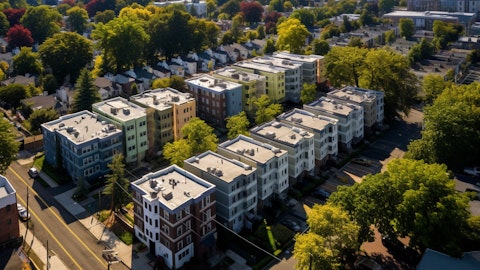Coffee is one of the most widely consumed beverages globally, however, not many investors are bullish on coffee stocks right now as AI seems to be getting all the attention. The coffee market is growing and estimates by Mordor Intelligence valued it at $132.13 billion in 2024. The market is expected to grow to $166.39 billion by 2029, at a compound annual growth rate of 4.72% over the forecast period.
Consumers are currently worried since coffee sellers have predicted that the already high prices will spike even more in the near future. Supply disruptions from Vietnam to Brazil have resulted in high prices for the Arabica and Robusta beans. The reasons behind the surge in prices are diverse. While weather conditions in major coffee bean exporting nations including Brazil and Vietnam have impacted the size and quality of the arabica beans, rising demand in markets such as China also tightened the supply. Considering the fact that Arabica beans are preferred by coffee giants and Robusta beans are best for instant coffee, there is no sense of relief for the end consumers who are paying for their daily dose of coffee.
Prevailing Trends in the Market
As reported by the World Bank, the beverage price index hit a 13-year high in February as a result of the surging prices of Robusta coffee and cocoa. Coffee Arabica and Coffee Robusta prices hit $4.61 and $3.38 per kilogram, respectively. The reaction of the industry to these prices has been diverse. While some suppliers have warned consumers of further price hikes for their products, other coffee chains are finding store closures convenient. The competition for supplies continues to rise as the demand for coffee in non-traditional markets is expanding. While the dynamics of the market have shifted to more online orders or drive-throughs, some critics mention coffee brands have let go of the idea of offering premium customer service in stores.
The real question revolves around what the coffee industry holds for consumers in the future. While many believe that the price hikes will not be so severe, the underlying challenge penetrating coffee-producing regions is climate change and not just bad weather. Although pests and diseases due to heavy rainfall impacted the coffee yield in Brazil, just like the high temperature in Vietnam, the issue is more dense. Considering the fact that such regions can become unusable by 2050 if the circumstances persist, the coffee industry remains under serious threat.
The coffee market may be under pressure but it goes without saying that caffeine is a staple in today’s high-paced world. Whatever challenges persist, products from top coffee companies will continue to be on the shelves of retail stores and in the kitchen cabinets of consumers. Coffee stocks might even be ideal for recession-proofing your portfolio. With that, let’s dive into the 7 best coffee stocks to buy now.

7 Best Coffee Stocks To Buy Now
Our Methodology:
In order to compile a list of the 7 best coffee stocks to buy now, we first sifted through ETFs and online rankings to gather a preliminary list of 20 coffee stocks. We then selected the top 7 stocks that had the highest number of hedge fund holders as of March 31. The 7 best coffee stocks to buy now are arranged in ascending order of their number of hedge fund holders, as of the first quarter of 2024. We have also included analysts’ average upside potential for the stocks in our list.
Why are we interested in the stocks that hedge funds pile into? The reason is simple, our research has shown that we can outperform the market by imitating the top stock picks of best hedge funds. Our quarterly newsletter’s strategy picks 14 small and large-caps every quarter and it has returned 275% since May 2014, beating its benchmark by 150 percentage points (see more details here).
7 Best Coffee Stocks To Buy Now
7. Nestlé S.A. (OTC:NSRGY)
Number of Hedge Fund Holders: N/A
Average Upside Potential as of July 31: 27.4%
Nestlé S.A. (OTC:NSRGY) is a food and beverage company that sells products in 188 countries across the world. With 150 years of expertise in heath, wellness, and nutrition, Nestlé has grown from being a European company to a reputable global firm operating over 340 factories in 77 countries. The company has a leading portfolio of over 2000 brands across several categories including coffee, cereals, water, dairy, drinks, confectionary, and many more. Nestlé serves as the world’s largest coffee buyer and owns some of the most iconic coffee brands including Nescafé and Nespresso.
Nestlé S.A.’s (OTC:NSRGY) coffee business continues to thrive in the extensive global market it has captured. Nescafé dominates the instant coffee market. Over 6,100 cups of Nescafé instant coffee are consumed every second. CNBC reveals that although the instant coffee market is not a large segment in the US, one in seven cups of coffee consumed worldwide is Nescafé, an iconic brand selling in 180 countries and has 25 factories making it globally. Simultaneously, Nespresso alone is an international brand having a network of 802 boutiques in 515 cities and a solid presence in 81 countries. While the Nespresso capsules are produced in Switzerland, they are exported across the globe. Over the past 5 years, the company’s soluble coffee and coffee systems revenue has grown at a compound annual growth rate of 12.3%.
The company’s powdered and liquid beverages category is the largest and includes the coffee, cocoa, and malt beverage businesses. Coffee remains a promising domain for the company as the category witnessed high single-digit growth in 2023 with positive sales developments across brands. The powdered and liquid beverages category continued its dominance and recorded CHF 24.8 billion ($29 billion) in sales while soluble coffee and coffee systems accounted for 67.2% of the total sales. Overall, the company had CHF 93.0 billion ($109 billion) in group sales with organic growth of 7.2%. Even in the half-year results for 2024 reported by the company, coffee served as the biggest organic growth contributor with mid-single-digit growth. The ability to capture markets for Nestlé remains strong as well since it was successful in introducing coffee to 10 million Indian households in 2023 (a country where tea is traditionally preferred).
Nestlé S.A. (OTC:NSRGY) has also been witnessing increasing free cash flow generation. Although the existing consumer environment is challenging, the company continues to drive growth through its billion-dollar brands including Nescafé, KitKat, Maggi, Purine One, and Nestlé Carnation. As of March 31, Gardner Russo & Gardner is the largest shareholder in the company with a stake worth $770 million. Analysts are also bullish and see an upside of 27.4% from current levels.
6. Luckin Coffee Inc. (OTC:LKNCY)
Number of Hedge Fund Holders: N/A
Average Upside Potential as of July 31: 63%
Luckin Coffee Inc. (OTC:LKNCY) is a Chinese coffee company headquartered in Xiamen. The company was founded in 2017 and currently operates the largest number of stores in China. Luckin Coffee Inc. (OTC:LKNCY) engages in the roasting and grinding of high-quality Arabica coffee beans. Coffee offered by the company is chosen from over 180 blending formulas. This coffee is tested and blended by World Barista Championship (WBC) champions who come from multiple countries including Italy, China, Poland, Japan, and Australia.
The company’s competitive edge is evident from the fact that it has even surpassed the global coffee giant Starbucks in the local market. Luckin Coffee now dominates the Chinese coffee market by being the first chain coffee brand in the country to have 10,000 stores after the opening of its Zhongshan Road flagship store in June 2023. The company is capturing a broader market of Chinese customers who prefer affordable coffee options and heavy discounts as compared to Starbucks. Other than the low price, the company differs from low-end Chinese brands on the basis of quality.
Luckin Coffee Inc.’s (OTC:LKNCY) innovative business model based on a mix of online and offline has emerged as its strength. The company engages with customers remotely through a mobile app and other third-party platforms while simultaneously operating stores to have better delivery coverage. Furthermore, Luckin has unlocked rapid market growth by employing a combination of self-operated stores and franchises as compared to Starbucks, which owns its stores. The company had 16,218 stores in China by the end of 2023 almost doubling the store count of 2022. Luckin Coffee Inc. (OTC:LKNCY) also debuted in Singapore for the first time in March 2023.
The company remains resilient for effectively rebuilding its business after initially going public in 2019. The Chinese coffee company encountered a major setback in 2020 when its earnings were reported to be fabricated resulting in a $180 million fine by the US Securities and Exchange Commission. However, the company has managed to grow its revenue by 69.09% over the last 5 years. For the first quarter of 2024, the firm launched 22 new products and added 2,342 new stores. It recorded a historic high in cumulative transacting customers through the expansion of its stores. However, the profitability slightly declined as a result of seasonality and intense competition in the Chinese coffee market. The company plans to increase stores in high-tier cities while targeting low-tier cities through its partnership model.
While the formerly tea-drinking Chinese market has witnessed strong coffee consumption over the recent year, especially among the younger generation, the company is poised to grow. A unique business model, a market-leading position, product innovation, and robust revenue growth are other factors that point to the company’s attractiveness. Based on ratings and price targets from 4 analysts, Luckin Coffee (OTC:LKNCY) has a consensus Buy rating and its average price target of 225.15 yuan ($31.45) implies an upside of 63% from current levels.




